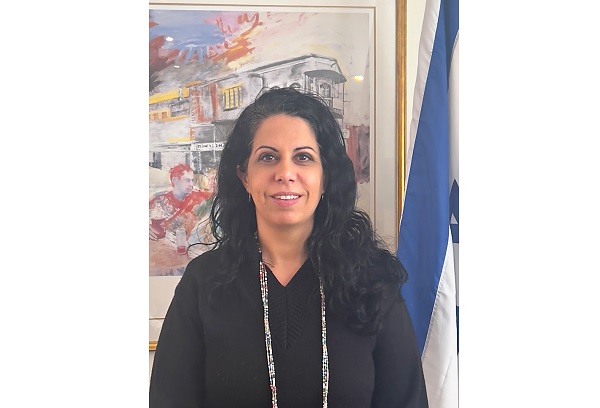 Idit Rosenzweig-Abu, Israel's Ambassador to Belgium and Luxembourg;
Credit: Embassy of Israel in Brussels
Idit Rosenzweig-Abu, Israel's Ambassador to Belgium and Luxembourg;
Credit: Embassy of Israel in Brussels
On Tuesday 1 October 2024, Chronicle.lu spoke with Israel's Ambassador to Belgium and Luxembourg, Idit Rosenzweig-Abu, about the current situation in the Middle East, as well as Israel-Luxembourg relations.
Ambassador Rosenzweig-Abu is based in Brussels but visits Luxembourg every two months or so to "touch base". Her visit on Tuesday included meetings with Luxembourgish politicians, for example at the Ministry of Foreign Affairs and the Ministry of Finance, and the media.
The last time she spoke with Chronicle.lu was during the visit of Hamas attack survivors and family members to Luxembourg in November 2023.
Speaking about the upcoming one-year anniversary of the 7 October attack, Ambassador Rosenzweig-Abu shared that the Embassy of Israel is planning a commemorative ceremony in Brussels. In Luxembourg, members of the Jewish community are set to get together for their own memorial on 7 October.
Asked about Israel's reaction to calls from the international community for a ceasefire in Gaza and more recently in Lebanon, specifically Luxembourg's position as reiterated by Foreign Minister Xavier Bettel at the United Nations General Assembly in New York last week, the Israeli Ambassador assured that "Israel is not against a ceasefire. Israel does not have any desire or interest in escalation". However, Israel has been trying to approach the situation "diplomatically for the last year", with little result, to allow its displaced inhabitants to return to their homes in the north of the country, she said.
The ambassador turned her attention to the 2006 Lebanon War, a 34-day conflict between Israel and the militant group Hezbollah, which ended with the UN Security Council Resolution 1701. Adopted unanimously in August 2006, the resolution (quoted directly from the UN text) called for "a full cessation of hostilities based upon, in particular, the immediate cessation by [Hezbollah] of all attacks and the immediate cessation by Israel of all offensive military operations". The resolution also called on the Lebanese government to deploy its forces "together throughout the South" and on the Israeli government, "to withdraw all of its forces from southern Lebanon in parallel". It also called for both countries to "support a permanent ceasefire and a long-term solution" based on various principles.
"Unfortunately, Israel withdrew from Lebanon but Hezbollah stayed and only grew stronger," commented Ambassador Rosenzweig-Abu. She later added that Israel is "still insisting there would be an immediate ceasefire in Lebanon if there would be an implementation of [resolution] 1701. Not a ceasefire for three weeks [as proposed by the US and certain European countries to allow for negotiations] - there is nothing to discuss". The ambassador insisted that Israel wants Lebanon to hold up its end of the agreement, at least in terms of immediate deployment, to "allow us to rebuild and reconstruct and reinhabit the north of Israel".
The interview focus shifted to the Israeli community in Luxembourg (exact figures unknown as they are not required to register at the embassy) and bilateral relations between the two countries. The ambassador noted that trade between Israel and Luxembourg has been "on the increase since 2020", having returned to pre-COVID levels. "2023 was a very good year, with a good increase of bilateral trade," she said, noting that the balance of trade tipped in Israel's favour: exports to Luxembourg reached about $54 million; imports stood at about $28 million. Only half-year data is available for 2024, but the ambassador noted there had been a decrease in commodities but an increase in services exported to Luxembourg, "which makes sense because we had issues with transport […] because of the war". However, "ties are still ongoing, and we are happy about that," she said.
In terms of cultural links, the Israel Embassy last held a cultural event in Luxembourg just before the Israel-Hamas conflict (2023), together with members of both the local Iranian and Israeli communities. "It was beautiful, it was for peace," the ambassador stated. Nevertheless, the embassy tries rather to help "connect Israeli artists to existing festivals", offering them greater exposure.
As the interview came to an end, Ambassador Rosenzweig-Abu reflected on the Jewish New Year, which begins this year at sunset on Wednesday 2 October. "It’s a big holiday for us. I really hope and wish for all of us that […] this year will conclude and a new year will start where we will have a ceasefire, we will have a positive direction to the region, we will be able to heal, we will see the hostages returning."
Chronicle.lu carried out this interview in the early afternoon of Tuesday 1 October 2024. Whilst the situation in the Middle East is quickly evolving, all efforts were made to ensure the information was correct at the time of the interview. More in-depth analysis of current events and developments is provided in separate (primarily "International") news articles.








